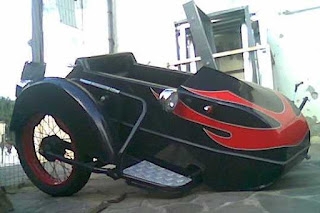Lack of a perceived "prestige": even though this matter is not so relevant for commercial operators, who value functionality and lower operating cost overall, it's known that a car may be regarded more aspirational for private users. So, even though a sidecar may be easily achievable in a shorter term, is not usually the first choice.
Nazi stereotypes: this seems to be more prevalent in Brazil. Whenever the possibility of getting a passenger-hauling sidecar rig is mentioned, its usage by Nazi German troops during World War II is always reminded. Surprisingly, all the people who expressed me their objections toward sidecars due to some reminiscence of Nazi military motorcycles were non-Jewish.
Requirement of a motorcycle endorsement for the driver license: sidecars rigs actually don't have a handling so close to the one of a motorcycle not fitted with this device, and are also not so identical to a car in this regard. However, since they occupy roughly the same space of a car over the roadway, most noticeably width-wise, the usage of sidecars could become more widespread among low-income customers in third-world countries if they were entitled to ride them without the requirement of a motorcycle endorsement on their driver licenses. Considering the lower purchase price compared to an average subcompact car and the higher maintenance cost of older jalopies which could be replaced by a sidecar rig, a legal provision enabling their riding by holders of a standard car driving license may become an effective way to decrease fuel consumption and emissions.
Perception as a makeshift approach: despite having its cost-effectiveness and suitability to many different tasks already proven, sidecars are still often pointed out as a mere makeshift. It's worth to notice that sidecars and trailers have a similar function, which is basically to expand the capabilities of the vehicles they're fitted to, so since trailers have already had their utility recognised maybe it's time to also consider giving sidecars a try.






Tricycles are easily found all around the Philippines bro, be it for cargo or passengers. I can agree they're not really appealing for so many people as a family hauler, but their role as a taxi or as a general-purpose workhorse is well proven.
ReplyDeleteA fascinating discussion is definitely worth comment.
ReplyDeleteI believe that you need to write more on this topic, it might not be a taboo subject but generally folks don't talk about such subjects.
To the next! Best wishes!!
Not a taboo for professional operators, and at least in the Philippines it's also well accepted for family hauling in the countryside, but it's still not fancy enough for people who only want to use a car to show-off.
DeleteSidecars are not bad-looking at all.
ReplyDeleteMan it could be an interesting option. Too bad in Venezuela nobody seems to have ever cared about it.
ReplyDeleteI am from Brazil and for me the Nazi stereotype seems somewhat pointless. I used to know a Jewish boy in my school days, and his favorite car was the Volkswagen Kombi.
ReplyDeleteWell, not sure if I would quote the Kombi as my favorite car overall, but when I was attending high school I considered the Kombi as the most realistic option when it comes to utility vehicles in Brazil. My only question was if keeping the stock gasser (or flexfuel) engine would be worth more than trying a Diesel swap. I was willing to try even a 2-cyl Agrale M-790 out of some small tractor, since it's also air-cooled.
DeleteI see no reason to prefer a sidecar rig other than price and ease of maintenance. Well, not sure if me owning an early Toyota Echo/Yaris would give me the entitlement to judge the transport needs of people in other countries with a much lower GDP, but I don't consider so realistic to propose such a move backwards and think of a sidecar as a viable replacement for a small car. Is even a cheap JDM 2nd hand import out of reach?
ReplyDeleteNot sure where you're from, but since you mention the Yaris as Echo, I presume you're either American or Canadian. Your point of view is valid, regardless of your country of origin, and I would agree with you to a certain extent if the import of used cars to Brazil weren't basically forbidden. Fewer exemptions are granted for diplomatic personell, and collectors who can import 30+ years-old cars. I don't know if Brazilian expats can still bring a car from overseas once they repatriate.
Delete